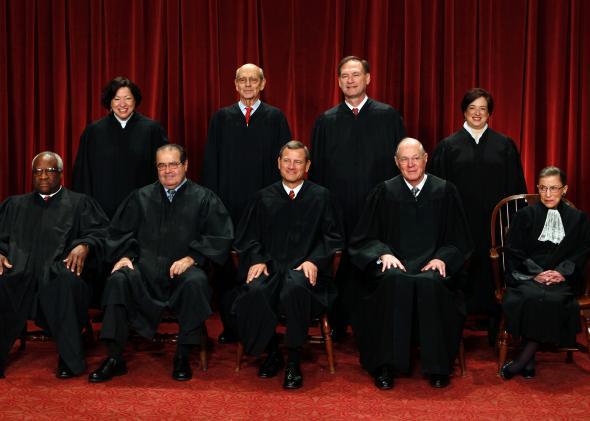In the wake of U.S. v. Windsor, judges across the country have struggled nobly to apply Justice Anthony Kennedy’s sweeping yet somewhat opaque opinion overturning DOMA. Some state courts tossed out state-level marriage bans by drawing on the spirit—not the letter—of Windsor. One federal judge accepted Justice Antonin Scalia’s challenge and struck down Utah’s marriage ban, reasoning that “the Court’s reasoning logically extends to protect an individual’s right to marry a person of the same sex.”
Now, Federal District Judge Terence Kern has overturned Oklahoma’s gay marriage ban—and his rationale is, in its own way, the most satisfying of them all. At first, Kern’s opinion seems like a complete loser for the gay plaintiffs challenging the state ban. Rather than cogitate about the appropriate level of legal scrutiny for gay people, as the New Mexico Supreme Court did, Kern simply assumes that gays only receive “rational basis” analysis, the lowest level of constitutional protection. He also flatly rejects the plaintiffs’ attempt to topple the remaining scrap of DOMA, and argues (unconvincingly) that the gay couples bringing suit have suffered no stigma due to their inability to marry.
But then Kern turns to the Supreme Court’s trio of gay rights opinions, Romer, Lawrence, and Windsor, and his intention becomes delightfully clear. None of these opinions, the judge notes, directly resolve whether state-level bans against gay marriage violate the U.S. Constitution. However:
Supreme Court law now prohibits states from passing laws that are born of animosity against homosexuals, extend constitutional protection to the moral and sexual choices of homosexuals, and prohibits the federal government from treating opposite-sex marriages and same-sex marriages differently. There is no precise legal label for what has occurred in Supreme Court jurisprudence beginning with Romer in 1996 and culminating in Windsor in 2013, but this Court knows a rhetorical shift when it sees one. [Emphasis mine.]
This deft bit of logic isn’t just a clever reading of the tea leaves—it’s a near benchslap to the Supreme Court, criticizing the justices for keeping their legal reasoning shrouded in mystery while consistently striking down anti-gay laws. All federal judges are bound by Supreme Court precedent, of course, but how can a judge possibly apply the law when the justices consistently refuse to explain precisely what kind of constitutional protections gay people are afforded? Trial and error works just fine for the Supremes, but a judge like Kern can’t rule based on a few emotionally compelling but legally hazy proclamations. Instead, Kern takes Justice Kennedy’s poignantly pro-gay language at face value, ignoring the justice’s admittedly ambiguous legal reasoning and using only his tone as a guide. The inevitable result: A ban like Oklahoma’s, which is plainly designed to make gay people’s lives more difficult, has to go.
This decision—which Kern has already stayed, pending appeal—may soon be considered by the justices themselves, as they mull their many options among gay marriage cases. Regardless, it’s immensely gratifying to see a judge finally call the Supreme Court’s bluff. For more than 15 years, the court has dodged the most important constitutional questions behind the gay rights battle. Until now, the strategy has worked. But as Judge Kern so slyly suggests, rhetoric can only carry a legal theory so far—now it’s time for some answers.
